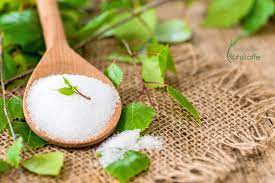So Sweet Xylitol has a similar level of sweetness than sugar but with a fraction of the calories.

A sugar replacement with fewer calories and a low glycemic index is xylitol. According to some research, it may also have antioxidant effects, reduce ear infections, and enhance dental health. As a form of carbohydrate that is not alcoholic, xylitol is a sugar alcohol. Natural sources of xylitol include trees,
corncobs, fibrous fruits and vegetables, and even the human body. Because xylitol has fewer calories and sweetness similar to table sugar, manufacturers utilize it as a sugar substitute. Many items, including toothpaste and sugar-free chewing gum, contain xylitol as a component. Additionally, xylitol is utilized in baking and as a tabletop sweetener.
A variety of foods are produced with xylitol added, including:
a. Candy without sugar, such as gum, mints, and gummies
b. Jellies and jams
c. Honey
d. Peanut butter, among other nut butters
e. Yoghurt
Additionally, xylitol is a component of various dental care products, such as:
a. Toothpaste
b. Mouthwash
c. Additional fluoride-containing goods
Unlike sugar, xylitol has a sweet flavor but doesn't contribute to tooth decay. In addition to acting against some bacteria that cause ear infections, it lowers salivary levels of bacteria that cause tooth decay. It is frequently found in chewing gum, mints, and other candies that are "sugar-free." Products containing xylitol are permitted to claim in the US that they lower the risk of cavities. Additionally, xylitol is used by many people to avoid dry mouth, ear infections, dental decay, and other problems, but the majority of these applications lack strong scientific backing.
So do you think that you are the one who needs to cut the calorie intake?
Then replace your traditional sugar with plant-based So Sweet Xylitol and enjoy your life without any calorie intake guilt.
corncobs, fibrous fruits and vegetables, and even the human body. Because xylitol has fewer calories and sweetness similar to table sugar, manufacturers utilize it as a sugar substitute. Many items, including toothpaste and sugar-free chewing gum, contain xylitol as a component. Additionally, xylitol is utilized in baking and as a tabletop sweetener.
A variety of foods are produced with xylitol added, including:
a. Candy without sugar, such as gum, mints, and gummies
b. Jellies and jams
c. Honey
d. Peanut butter, among other nut butters
e. Yoghurt
Additionally, xylitol is a component of various dental care products, such as:
a. Toothpaste
b. Mouthwash
c. Additional fluoride-containing goods
Unlike sugar, xylitol has a sweet flavor but doesn't contribute to tooth decay. In addition to acting against some bacteria that cause ear infections, it lowers salivary levels of bacteria that cause tooth decay. It is frequently found in chewing gum, mints, and other candies that are "sugar-free." Products containing xylitol are permitted to claim in the US that they lower the risk of cavities. Additionally, xylitol is used by many people to avoid dry mouth, ear infections, dental decay, and other problems, but the majority of these applications lack strong scientific backing.
So do you think that you are the one who needs to cut the calorie intake?
Then replace your traditional sugar with plant-based So Sweet Xylitol and enjoy your life without any calorie intake guilt.









